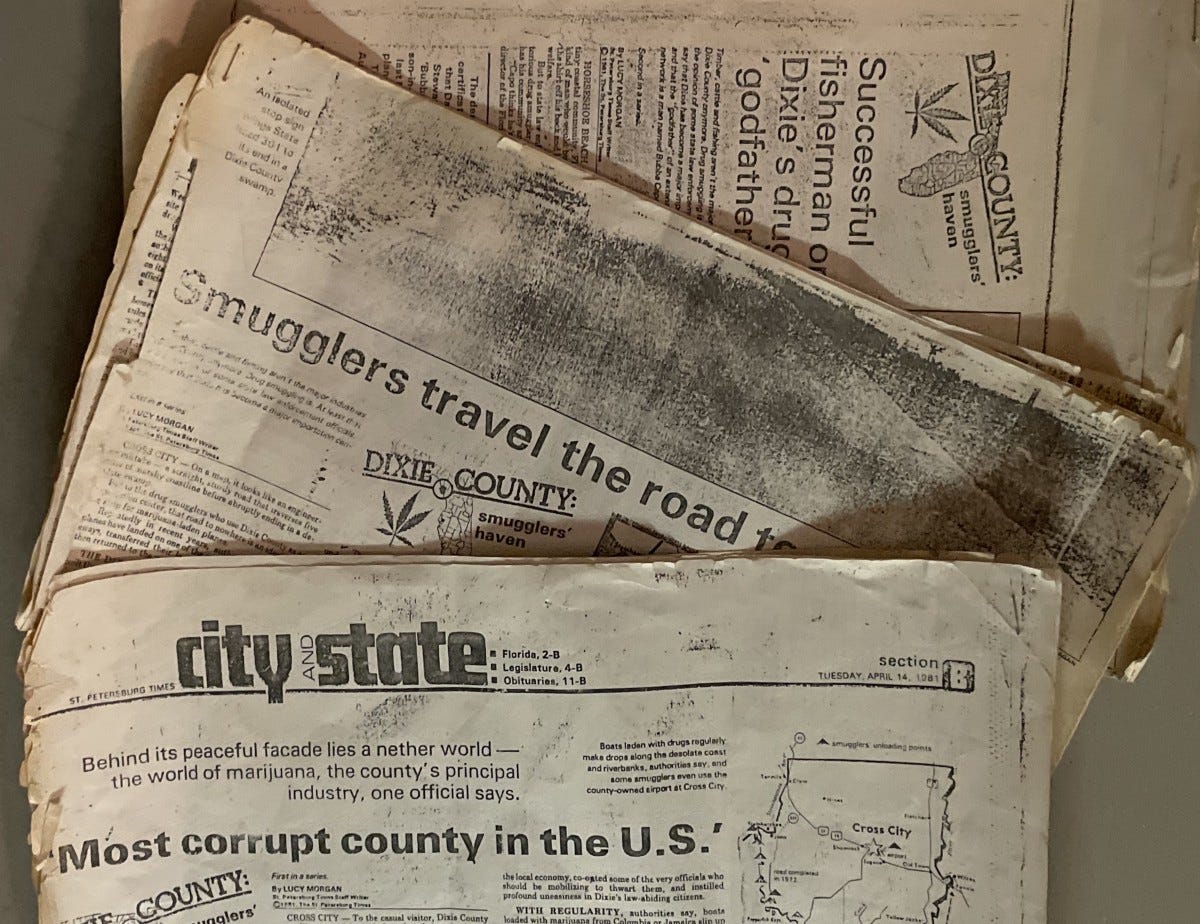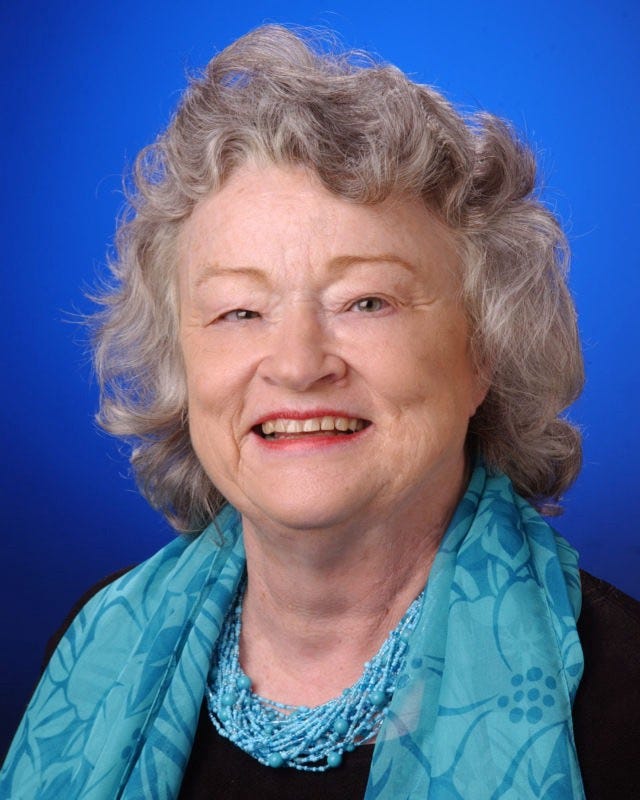The Road to Lucy Morgan
How I connected with my Pulitzer Prize-winning childhood shero 40 years later and what she means to me, my town and the dwindling universe of local investigative journalism.
For forty years I have been toting around a yellowed collection of newspaper stories by Lucy Morgan.
The stories came with me in the one suitcase I packed when leaving the town where I had spent my formative years and never looked back. The stories were with me when I graduated journalism school at the University of Florida. The stories came along with me to my first $14K a year copyediting job at a Florida newspaper, and they were with me when I graduated Harvard Business School. When I had 3 kids in 4 years working at a Silicon Valley startup, and … well you get the idea. It wasn’t until the life slowed to a crawl during the pandemic that I came across them, once again.
The universe, it seems, planned it that way.
Forty years later, I found my way back to my childhood shero. Back then she was a middle-aged Florida newspaper reporter and mother of 3 whose relentless pursuit of truth took down the largest U.S. drug-smuggling operation in history at that time. The Tampa Bay/St. Pete Times articles catapulted her infamous Southern journalism career into the national spotlight exactly 40 years ago this day — April 14th.
Four decades later, her name still graces the door of the Florida Senate Press Gallery. She was — and still is — the most-admired and most-dreaded investigative reporter to ever break a leg (literally an ankle) in the State Capitol. Morgan’s hard-hitting series which revealed a secretive rural, Northern Florida community as “the most corrupt county in the U.S.” first ran as a series in April of 1981. After a years-long investigation, she is credited with enabling a mind-boggling 250 arrests, prosecutions and convictions in the years that followed.
By 1980, Morgan was driving almost daily into sparsely-populated Dixie County, dressed in a skirt, heels and stockings while traipsing through the swampy inlets of the Gulf-fed creeks and insect-infested acres of piney woods. She spent equally long hours in government buildings with just pen and notepad, documenting her brand of the truth: copying thousands of simple public records while following a trail of corruption that included government officials and sheriff’s deputies, as well as simple fishermen and loggers…and even a 5-year old.
As a local high school student, I experienced the town as a young person whose friends and classmates lost parents and family members to death, to prison and to the shame of letting their families down. I was working as a $7/day waitress at the town’s restaurant where Lucy Morgan first appeared. She was an outsider to Cross City, FL, just like me. I had moved there at age 12 from Miami; culture shock to say the least. By age 15, I was watching her, learning from her. She is the reason I became a journalist. It’s a full circle moment for me.
Her investigative journalism exploits, laid out on the pages in black and white, took the town by surprise as there was no local newspaper reporting the crimes. None were following the sheriff’s investigation — or lack thereof — despite odd discoveries, illegal activities and even deaths resulting from regular citizens risking everything to get a piece of the notorious marijuana drug trade action.
State law enforcement agents who worked diligently alongside Morgan to break up the ring that injected millions of dollars into the local economy, estimated at the peak of the drug trade more than 70% of Dixie’s residents were involved either as a smuggler, an informant, by protecting a relative, and sometimes desperately hoping to stay anonymous while helping the “outsider” Morgan was.
Morgan was an outsider to this closed society, true, but she did have an advantage. “Between my charming Southern accent, calm demeanor and the town’s code of silence, the good ol’ boys didn’t take me too seriously…by the time they did, it was way too late, “ Morgan, now 80, recalls.
“Between my charming Southern accent, calm demeanor and the town’s code of silence, the good ol’ boys didn’t take me too seriously … by the time they did, it was way too late.” — Lucy Morgan
The town’s leaders even approved a 12-mile road which dead-ended into the swamp and it served as a working airstrip for smugglers. It was dubbed The Road to Nowhere. For years, residents would complain of low-flying aircraft in the middle of the night, including one crash that smugglers hid with palm fronds and leaves — taking the cargo, but leaving the dead pilot’s body to decay for years thereafter, her sources revealed.
The Road to Nowhere still exists (top photo). I even learned to drive as a teen on that road. These smugglers, informants and regular folks trying to help Mrs. Morgan? They were the parents and relatives of my friends and schoolmates. My mom was a teacher making less than $120/week. Meanwhile, peers were suddenly driving shiny new pick-ups and wearing the latest Jordache jeans. It was unsettling. Anyone paying attention knew something was off, but were too scared, or too involved, to say anything.
Threats were made. Accidents happened. Homes burned. Family members vanished. Single car crashes were deemed suspicious and, though barely covered in the news if at all, a shocking string of suicides occurred by some of those who could not face prison, or worse, the shame of their families, in this closed community. Many participants and the local sheriff saw marijuana importation as a victimless crime. Morgan did not. Neither does history.
The Florida Department of Law Enforcement agents spent challenging days and sleepless nights to wiretap informants, recruit help from townspeople, and babysit criminals through trial convictions and into prison. Families were torn apart and the impact on the next generation’s mental health lingers still as the town suffers even today from its efforts to invest in the drug trade rather than building solid job opportunities for the future. Meth has taken up residence where pot once called home.
Retired FDLE Commissioner Jim York, now 80, who was in charge of the 1980s investigation, retains deep respect for Morgan: “She was always a straight shooter. If Lucy was involved, you could trust it was worth your time and your resources.”
Surviving FDLE agent Jerry Peters, 74 — who with his, now deceased, partner Ronnie Cornelius poured a lot of sweat and hustle into sleepless nights along with Morgan in search of the truth. She pieced together information and benefited from their alerts of incoming marijuana-laden shrimp boats. Their origin usually either Colombia or Jamaica; their destination the small “bird dog” boats awaiting just offshore to be loaded with bales of pot to slip silently through skinny waters and eventually onto trucks destined for dealers.
She listened to surveillance tapes while she drove nearly three hours roundtrip daily only to spend hours back in the newsroom filing her painstakingly-collected public records. It was her preservation of her meticulous hand-written notes — and the protection of her key sources’ identities — which built a paper trail proving guilt that was so outrageously denied verbally in court. “We could have never done it, never have achieved the significant prosecutions of so many if it hadn’t been for Lucy. She set the bar for how reporters and law enforcement can build a case and bring down the bad guys together,” Peters said.
“We could have never done it, never have achieved the significant prosecutions of so many if it hadn’t been for Lucy. She set the bar for how reporters and law enforcement can build a case and bring down the bad guys together.” Jerry Peters, retired FDLE agent
In today’s world where we speak to Siri for directions and can perform a background check on that creepy guy following you on the Internet with just a click, it is not lost on me the tenacity, dedication, and talent it took Lucy Morgan to accomplish the goal of bringing the “most corrupt county in the U.S.” to justice. It was a lot easier for me to find her, visit with her and her 90-year-old husband, Richard, also a lifelong newspaperman, recently in Tallahassee, and fill each other in on the past 40 years.
It wasn’t a one-and-done for Morgan. After being nominated and named a finalist for the Pultizer Prize (journalism’s highest honor) in 1982, Morgan went on to win the Pulitzer just three years later, with fellow reporter Jack Reed, for bringing down a corrupt sheriff and his department, coincidentally in Pasco County, her backyard. She was the first woman to do so in the investigative reporting category. Again with no computers, cell phones or Alexa, just following her practice of backing up her sources’ accusations with public records.
We so rarely get the chance to tell our childhood sheroes how they impacted our lives, much less be reunited with them. My personal path to reconnect with Lucy Morgan has been 40 years in the making. I feel honored and humbled by the mutual respect and trust Lucy and I have developed and am grateful for the rights to tell this story from a unique perspective. I and so many are indebted to her for what she’s done to stay involved to protect the rights of journalists even to this day.
We both had an insane love of reading books as young women — it was the basis for how Lucy got her first job at a newspaper without a college degree. We both want to encourage young women to pursue journalism, to seek the truth, and to learn the tools and techniques of investigative journalism that can lead them to it.
We both want to encourage young women to pursue journalism, to seek the truth, and to learn the tools and techniques of investigative journalism that can lead them to it.
What we have been witnessing in this country over the past decade is the loss of more than 30,000 local reporting jobs that aren’t coming back. I am inspired to continue a dialogue here and through other outlets to reignite a new generation of young reporters to keep hometown journalism — and hope — from fading into the darkness of unchecked corruption.
Thank you, Mrs. Morgan, for continuing to shine the light and taking damn good notes wherever it lands.
_________________________________________________________________
This my third project through my production LLC: Hold This While IP. My recent screenplay, The Healdsburg Home for the Terminally Sexy, is a feature-length comedy currently with Di Novi Pictures. I am collaborating on a limited series television drama called Hot Flashes, an adaptation of author Barbara Raskin’s 1987 NYT best-seller by the same name, with Rosa Salazar Arenas and David Paul Kirkpatrick. I am fully vaccinated and fully confident about the future. Please follow me here on medium.com and on IG @pamela_weiss_ . I would love to hear your thoughts and your own hometown journalism stories.



